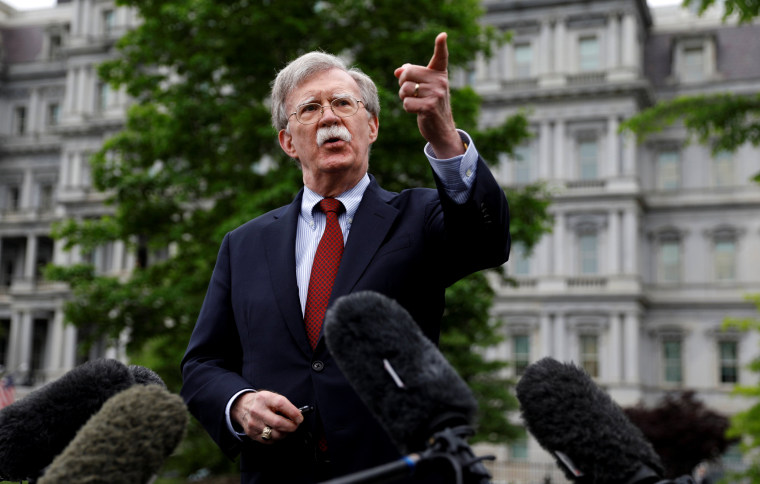WASHINGTON — Former national security adviser John Bolton failed to appear Thursday for his closed-door deposition in the House impeachment inquiry, following the lead of other current and former Trump administration officials who have chosen not to show up.
Last week, Bolton — who was fired by Trump in September — was formally invited to testify before the three congressional committees leading the inquiry, but his lawyer, Charles Cooper, quickly made clear that his client was unwilling to appear voluntarily.
Bolton was scheduled give his deposition at 9 a.m. ET, but did not show up.
Jennifer Williams, special adviser to Europe and Russia to Vice President Mike Pence, did arrive Thursday for her scheduled deposition.
“Jennifer is a longtime dedicated State Department employee," her attorney, Justin Schur, said in a statement. "If required to appear, she will answer the committees’ questions. We expect her testimony will largely reflect what is already in the public record.”
An official working on the impeachment inquiry confirmed to NBC News that Williams was issued a subpoena Thursday morning to compel her testimony.
Bolton has not been issued a subpoena, according to Cooper, his attorney.
Bolton's no-show comes after his former top deputy, Charles Kupperman, defied a subpoena and skipped his own scheduled deposition amid efforts by the White House to block his appearance. Kupperman, who is also represented by Cooper, then filed a lawsuit asking a federal judge to rule on whether he must testify under a congressional subpoena.
The House, seeking to avoid a delay in the impeachment inquiry, withdrew the subpoena, an Intelligence committee official told NBC News on Wednesday.
In a letter to Kupperman and Cooper, the chairmen of the three committees leading the inquiry said they would expect him to abide by whatever decision comes down in the House Judiciary Committee's lawsuit involving former White House counsel Don McGahn. The House filed a lawsuit in August to enforce a subpoena and compel McGahn's testimony as a central witness in special counsel Robert Mueller's report on Russian election interference and Trump.
That case, the Democratic chairs argued in their letter, is "procedurally much much further along."
"The House's impeachment inquiry will not countenance, however, further efforts by witnesses or the White House to delay or otherwise obstruct the committees' vital investigatory work," they wrote.
If Bolton were to testify, he would be the most high-profile witness yet in the impeachment investigation. He has been named in the testimonies of other officials who recounted a concerted effort by President Donald Trump and his associates to pressure Ukraine to launch and publicly announce politically advantageous to Trump in exchange for the release of military aid.
According to the transcripts of previous testimony made public as well as reports from inside the room, officials have told lawmakers that Bolton was disturbed by the administration's push to get Ukraine to probe former Vice President Joe Biden and his son Hunter Biden, as well as a conspiracy theory related to the 2016 presidential election.
Bill Taylor, who currently serves as the top U.S. diplomat in Ukraine, told lawmakers in his deposition last month that he was told by two National Security Council officials that Bolton abruptly ended a meeting with Ukrainian officials in early July after U.S. ambassador to the European Union Gordon Sondland brought up the idea of “investigations."
This "triggered Ambassador Bolton’s antenna, political antenna, and he said, 'We don’t do politics here,'" Taylor told impeachment investigators, according to the transcript of his testimony released Wednesday.
Taylor also testified that Bolton was opposed to the idea of Trump holding a phone call with Ukraine’s president because Taylor said “he thought it was going to be a disaster.”
Former White House official Fiona Hill reportedly told Congress in October that Bolton was so disturbed by the administration's actions toward Ukraine that he called it a "drug deal." Hill added that Bolton told her to report the situation to the top lawyer at the NSC, and that Bolton also was said to have referred to Trump’s personal lawyer, Rudy Giuliani, as a "hand grenade."
The House Intelligence Committee is set to begin the first public hearings in the impeachment inquiry next week. The first open hearing, to be held Nov. 13, is slated to hear testimony from Taylor and State Department official George Kent. The second hearing, scheduled for Nov. 15, is expected to include testimony from former U.S. Ambassador to Ukraine Marie Yovanovitch.


